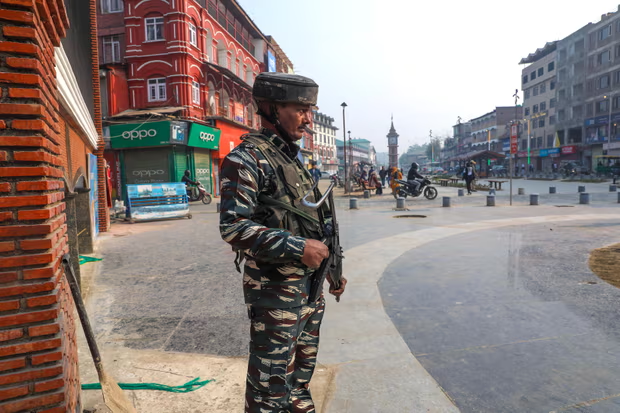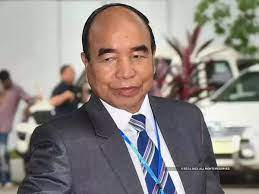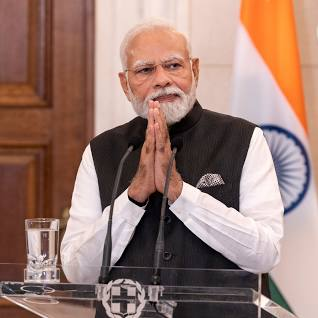"You will not find a brother like me, and remember me when I will not be there (for you). I have changed the definition of politics in Madhya Pradesh. I don't run a government, I run a family because all of you are like a family to me," said CM Shivraj SIngh Chouhan.
“ऐसा भैया मिलेगा नही तुम्हें,जब मैं चला जाऊंगा तब तुम्हे याद आऊंगा"
Tribal votes - Good indicators of electoral fortunes in Madhya Pradesh
New Delhi
Even as caste politics and Hindutva angles are played out in the central Indian state of Madhya Pradesh; in elections year after year it is the tribal votes that have played more crucial roles in deciding the fate of either Congress or the BJP.
 |
| My story in Enadu, prestigious Telugu newspaper |
The BJP had won 37 seats out of 41 reserved seats in 2003 polls making it's journey easier for recapture of power in the state after a long innings of Congress strongman Digvijaya Singh. Ten years later, the BJP won 31 seats helping Shivraj Singh Chouhan return to power for third time. But in 2018, the Congress turned the table and won 31 out of 47 and ultimately led to the emergence of Kamal Nath government.
Of course, Kamal Nath had to bow out by 15 months and Shivraj had captured power again. But in the run up to 2023 crucial polls; anti incumbency is haunting BJP and hence the Congress has reasons to exude confidence. In Madhya Pradesh polls tribal voters also hold master key in 40 other assembly segments and hence it is they who can influence the poll outcome.
While BJP has played up the well known Sabka Saath, Sabka Vikas card and Narendra Modi's image of a performer Prime Minister, the Congress has pledged to empower tribals by implementation of the Sixth Schedule in the districts having more than 50 percent of tribal population and also enactment of Panchayat Extension to Scheduled Areas. In fact, Congress had planned it's move to woo tribal votes effectively and no less than Congress general secretary Priyanka Gandhi Vadra had announced it's plans for tribal empowerment at an election rally at Mandla on Oct 12.
There are six tribal majority districts Barwani, Jhabua, Dhar, Dindori, Alirajpur and Mandla. The 6th Schedule norms will change the games expectedly in these districts.
The battle for Mandla has turned exciting as BJP has fielded Union Minister Faggan Singh Kulaste to fight the Niwas seat. This is a Congress stronghold seat as the grand old party had won it by about 28000 votes.
Moreover, crime against tribals is quite in large numbers in Madhya Pradesh and hence these too could be used against the Shivrajsingh regime.
The NCRB reported that in 2021, 52 cases of murder were reported in which the victims were Adivasi persons. In the category of assault on tribal women with the intent to outrage their modesty, 308 cases were reported in 2021. The NCRB also reported 376 cases of rape against Adivasi women in the state in 2021.
However even as Congress journey has been a confident one in Madhya Pradesh; skirmishes with its alliance Samajwadi Party could impact the prospects in some seats.
Tensions between the two alliance partners rose after BJP released its first list of 144 candidates in Madhya Pradesh last week.
Responding to the Congress party's argument that the INDIA alliance was meant for national politics and not assembly elections, SP supremo Akhilesh Yadav has accused the Congress of betrayal.
“We would have not given them the list and would have not picked the phone calls of Congress leaders. They betrayed us. Are they making fools of us? Why Kamal Nath and Digvijay Singh kept us engaged in meetings? The Congress leaders are in a nexus with the BJP,” he said.
Congress leaders Ajay Rai and former CM Kamal Nath have flayed Samajwadi Party and hence if remains to be seen how caste equations and differences between Congress and SP would help the BJP.
For its part, the BJP understands the importance of retaining power in Madhya Pradesh. Hence meticulous planning had gone in selection of candidates.
BJP has announced its candidates for 228 seats in the 230-member Madhya Pradesh assembly so far.
Devendra Kumar Jain was nominated for the Shivpuri seat after Jyotiraditya Scindia's aunt, Yashodhara Raje Scindia, declined to participate in the elections.
Sachin Birla, who had previously left the Congress party to join the BJP, was nominated in the Barwah constituency. The BJP fielded Siddharth Raj Tiwari, who had recently defected from the Congress and joined the BJP, to contest from the Tyonthar constituency.
For Congress, from the Gwalior assembly seat, considered the bastion of Union Civil Aviation minister Jyotiraditya Scindia, the Congress has fielded Sunil Sharma. Sitting MLA and minister is Pradhuman Singh Tomar, a known Scindia loyalist. Pradhuman Singh Tomar had switched over to the BJP along with Scindia in 2020.
BJP triggered debate on Shivraj future:
On Sept 25, Prime Minister Narendra Modi visited the poll-bound state and addressed key election meeting.
Addressing a massive gathering of BJP workers, 'Karyakarta Mahakumb' in Bhopal, the Prime Minister cautioned the people that the Congress would push Madhya Pradesh back into the 'BIMARU' category of states if given an opportunity to rule again. Within days, BJP's second list threw up speculation on political fortunes of Kailash Vijayvargiya and Chief Minister Shivraj Singh Chouhan.
Once a low profile player, Chouhan, has been in office for quite long and maybe the BJP is exploring the possibilities of replacing him.
Top guns have made it to BJP's list.
The saffron party's nominees included local stalwart and BJP general secretary Kailash Vijayvargiya. The former in-charge for politically sensitive West Bengal and considered close to Home Minister Amit Shah, Vijayvargia has been named as party candidate from Indore-1.
Three central ministers -- Agriculture Minister Narendra Singh Tomar, Prahlad
Singh Patel and Faggan Singh Kulaste were also fielded.
After BJP failed to topple Mamata Banerjee in Kolkata in 2021 fiercely contested polls, senior Bengal leaders such
as Tathagata Roy, a former Governor of Meghalaya, had sharpened attacks against Vijayvargiya. However, the Lotus
party's key stalwarts Home Minister Shah and even party president J P Nadda have reportedly defended him more than
once in internal meetings.
Is BJP then looking for a suitable replacement for Shivraj Singh Chouhan in case the party can brave through the anti-incumbency factor this year?
The Lotus party has been in power in Madhya Pradesh since 2003 except for a brief period between December 2018 and March 23rd, 2020. For his part Chouhan is in office since November 30, 2005 when two (now deceased) BJP leaders Pramod Mahajan and Arun Jaitley favoured his candidature as CM instead of Uma Bharti.
Chouhan has to his credit leading the party to win in consecutive polls in 2008 and 2013 but in 2018,
he failed to get the magic numbers and the power had shifted to Congress veteran Kamal Nath.
If speculation about Vijayvargiya is too far-fetched, the inclusion of central minister Narendra Singh Tomar is also quite surprising.
While two other central ministers Prahlad Singh Patel and Faggan Singh Kulaste will contest from Narsingpur and Niwas respectively; onetime chosen man of PM Narendra Modi, Narendra Singh Tomar is contesting from the Dimni seat.
Tomar was a member of Fifteenth Lok Sabha from 2009 to 2014 from Morena. In 2019, he came back to Morena. Between
2014 and 2019, he represented Gwalior. While Tomar is 66, incumbent Chief Minister Chouhan is 64 and Kailash Vijayvargiya, 67, is the eldest among the three.
Congress infighting is turning serious.
On Oct 21, Madhya Pradesh state vice-president of the party, Damodar Singh, burnt the effigies of former CM Digvijaya Singh and his son Jaivardhan Singh. He alleged that Congress has not fielded enough candidates from the Other Backward Class (OBC). He resigned from the party and said he was fielding his candidates in 15 seats.
"When Rahul Gandhi claims that the rights will be given according to the population, then these two are not allowing it to be given. That's why I said, when they are setting fire to Congress, let's set fire to their effigies," Singh told reporters.
Damodar Singh, the state president of the party's OBC unit, alleged he had demanded 126 seats for the backward classes but the party gave only 55.
Ends
Box ___
**
Congress expected to do well in Madhya Pradesh's Chambal region has 34 sests. Congress could win 22-24 seats, local analysts say.
The fifth list of BJP introduces several candidates, such as former state ministers Jayant Malaiya and Surendra Patwa. Surendra, nephew of former MP chief minister Sunderlal Patwa, will contest from Bhojpur in Raisen district.
__ Mahendra Singh Sisodia, a loyalist of Union Minister Jyotraditya Scindia, is renominated from Bamori in Guna district.

































